Last week, after a year of doing science in Singapore, we packed our bags and headed back to our home town of Auckland, New Zealand. In a few weeks I’ll start back at the University of Auckland to kick off our project on the evolution of weaponry in harvestmen. In the meantime I’m enjoying taking time to catch up with friends and family, and even managed to find a few of my old pals, NZ giraffe weevils, on our first weekend back.
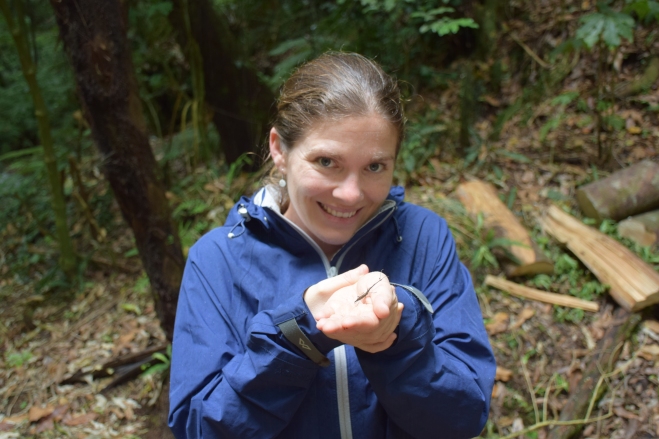
Reuniting with friends!
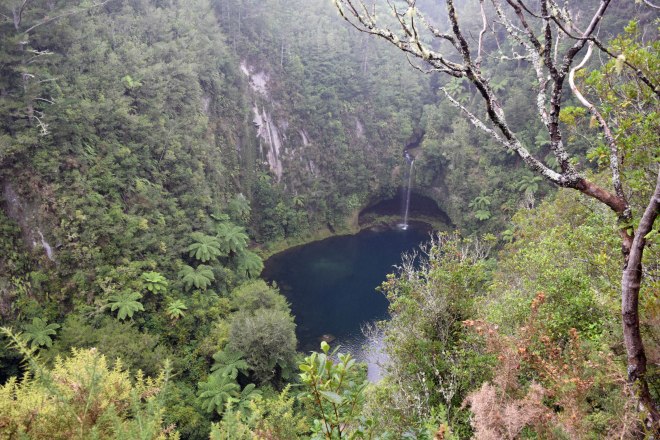
Paradise! Omanawa Falls near Tauranga
The last month in Singapore was hectic as I was trying to wrap up the project as best I could and make sure my undergraduate students were all sorted for carrying on their research. We also spent lots of time out in the jungle in a last ditch attempt to try and find my study species in Singapore (we found 1 male, 1 female and 1 juvenile!) and to try and glimpse some of the missing animals from our wish list.
These last few weeks happily coincided with a visit by Ummat Somjee, a PhD student from Dr Christine Miller’s lab at the University of Florida. Ummat is working on sexually selected traits in coreid bugs and was keen to find some nice candidates with exaggerated hind legs to work on. We found a fantastic species, Anoplocnemis phasiana, which has extraordinarily huge hind legs. Ummat spent his time in Singapore looking at how males and females invest into these huge hind legs and other body parts, and how males use these as weapons during fights with other males to secure females.
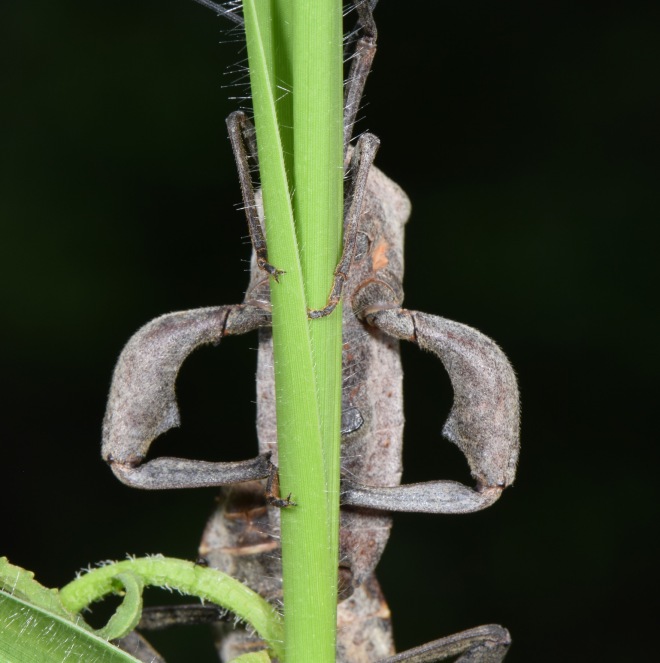
The incredible hind legs of a male Anoplocnemis phasiana
Ummat’s visit was a great excuse to revisit some of our favourite haunts too, including a final cycle around Palau Ubin, a little island off the east coast of Singapore. We were lucky to spot the flock of Oriental Pied Hornbills (Anthracoceros albirostris) that tend to hang around Jelutong Campground. However, we also noticed a completely black hornbill hanging around and realised it was a female Black Hornbill (A. malayanus), perhaps dispersed across from Peninsula Malaysia or an escaped pet.
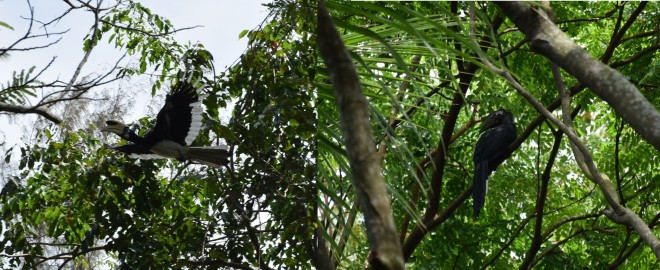
A male oriental pied hornbill (left) and a female black hornbill (right)
Back on the mainland we were also lucky to come across some great finds including a Wagler’s pit viper (Tropidolaemus wagleri), a paradise gliding snake (Chrysopelea paradisi), and several colugos or flying lemurs (Galeopterus variegatus).
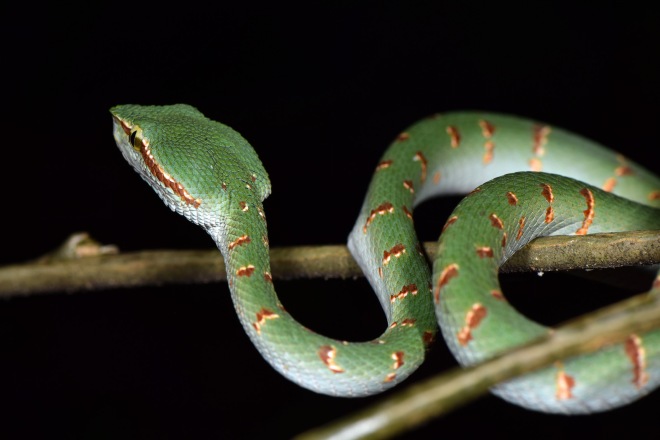
A juvenile or male Wagler’s pit viper at Bukit Timah Reserve
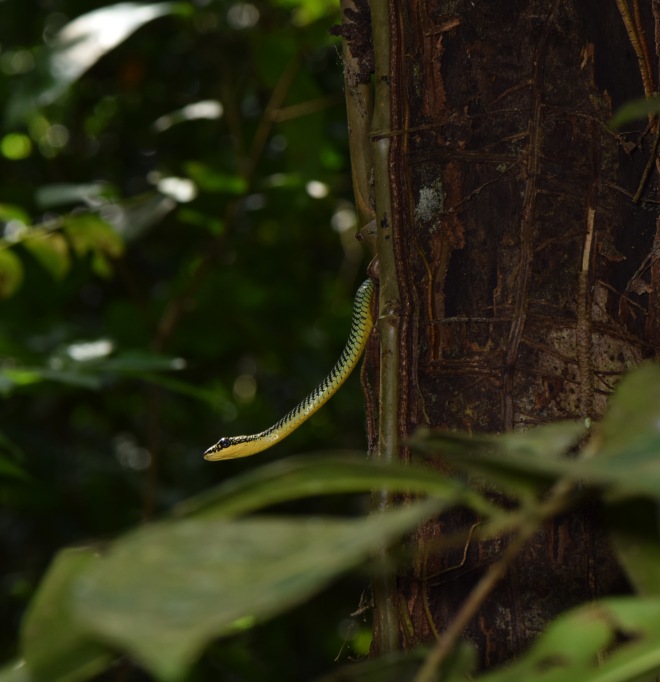
Paradise gliding snake at Dairy Farm Reserve
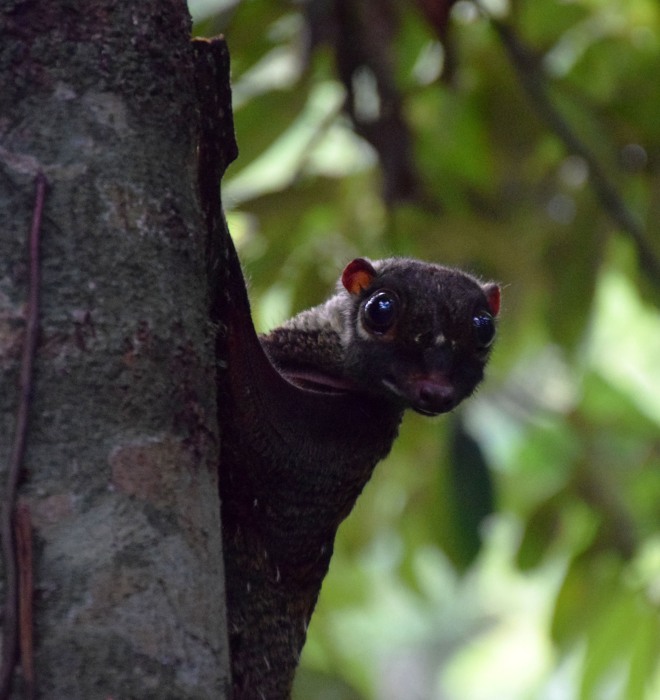
A curious colugo checking out Caleb with his camera
One of the most interesting finds was this Portia labiata jumping spider feeding on a huge Argiope spider. Portia are araneophagic (spider-eating) spiders that have incredible cognitive ability, leading to fascinating strategies for hunting different species. Portia are able to sneak up on their prey using very slow stalking behaviour combined with their leaf litter-like appearance. They are also known to pluck a spider’s web, imitating a struggling insect, to lure the resident spider towards them. When stalking venomous spitting spiders, Portia will approach from behind to avoid being perceived and attacked.
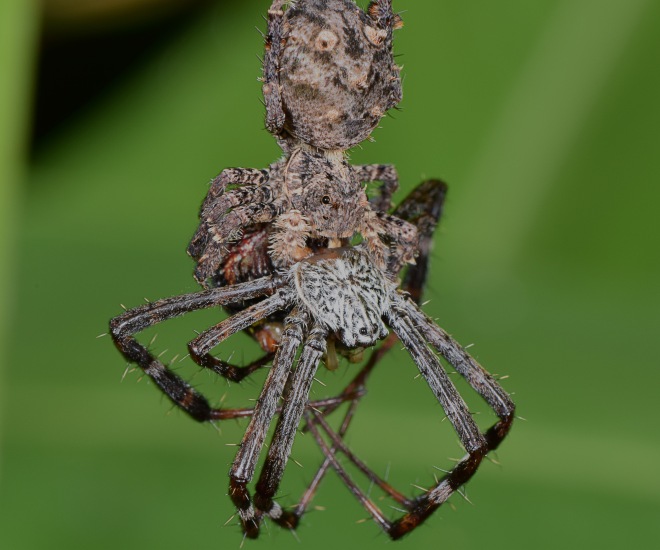
A female Portia hanging from a silk thread and munching on a huge Argiope spider
As well as all these fun trips around the island, I’ve also been reflecting on my year abroad and what is has offered me in terms of both professional and personal experience. Despite the challenges of adjusting to a very different culture and way of life in Singapore I am so happy I took the plunge. I was lucky to be able to go at a time in my life where I had few responsibilities (i.e. no kids or mortgage) and had the financial means to move both myself and my husband across the world to live off one income. This is important to recognise because I think there is an enormous amount of pressure on postdocs (actually all academics) to be super flexible and travel anywhere in the world to take up a job. Sophie Lewis wrote an excellent article about the expectation of academics to spread their career across multiple institutes and countries, and why she believes this is no longer necessary. I largely agree with Sophie and would have to say that a lot of the benefits to working abroad that I discuss below could have also been achieved via shorter-term research visits, conferences, and online networking.
The major benefits that I took away from my year in Singapore:
- Research experience: The most obvious and biggest benefit to working at NUS was working in a very different lab, working on a new study system in a different area of behavioural ecology. Although I’m keen to get stuck back in to my main research interest, I have come away with a new set of skills and lots of new knowledge about spiders and visual ecology that I didn’t have before. This has the potential to lead to all sorts of future opportunities and collaborations! Importantly this has also helped me to be better at problem solving, has stretched my brain to move into a field I knew little about and has helped me cross paths with a different group of researchers that I hadn’t interacted with before.
- Networking: There’s nothing like arriving in a new place with no friends to force one to get out there and make new contacts! NZ is far away from just about anywhere, so it has been a great to be somewhere a little more central to meet scientists based at NUS or travelling through Singapore.
- Tropical biodiversity: My knowledge of biodiversity is much richer than when I first arrived in Singapore. Working in the tropics was so different to temperate NZ and I found it incredible that I saw numerous new species every time I went out to the forest. I like to think this will be a source of inspiration for future project ideas, and help me to make comparisons to the temperate regions I’ve worked in. I have loads of great photographs (mostly taken by Caleb) that can be used as examples in teaching.
- Travel opportunities: Related to the point above, working in SE Asia led to so many amazing trips abroad to collect spiders or go on mini-vacations. Whether mucking around in the central catchment of Singapore or wandering the jungles & highlands of Malaysia it was exciting every time. Field work is the best part of my job and doing it across multiple countries in tropical Asia was just so fun.
- Learning to work with new people: Any new job requires learning to fit in with new people, but for me, working in a region of the world with a very different culture to my own has been a novel challenge. Our lab was made up of students from Singapore, China, Taiwan and Malaysia which has been so great for learning about cultural and religious practices from countries other than my own. I think it will help me to be better at supervising a diverse range of students in the future.
- My relationship: My husband didn’t work while in Singapore but spent a lot of time helping me in the lab and the field. We lived without a TV and had really great discussions each night over dinner or on evening walks. Having lots of days and every evening together was a big change for us after many years of shift work for Caleb. So, bizarrely given the strain that this job could have put on our relationship had we decided to do it long distance, Caleb’s unemployed “sabbatical” turned out to be a really great move for us.
The biggest challenges:
- Culture shock: It took a lot longer to settle in than I thought it would and despite Singapore being a rather westernized part of Asia, we still experienced culture shock. We got around this by really trying to learn as much as possible about our new country, going to festivals and eating/shopping where locals did. 2015 turned out to be a fascinating time to be in Singapore with the huge celebrations of 50 years of independence and the death of the beloved founding father Mr Lee Kuan Yew. It took ages to learn the basics though and sometimes tasks that would take me half an hour in NZ took me all day. One day it took me about 6 hours and 4 expensive taxi rides to source a piece of sandpaper that ended up costing me 40 cents!
- Pressure to hit the ground running: Largely driven by my own anxieties and self-expectations, I really struggled to get the project underway and feel like I was being a good postdoc. I guess it could be said that I was suffering from imposter syndrome, although at the time it just felt like I was a terrible scientist and about to waste a whole bunch of time and money doing something that a better qualified person should be doing. The first 5 months or so were pretty tough and I felt ungrateful for being given such a neat opportunity to live and work in a new place. Things got a lot better once we did a couple of lengthy field trips to Malaysia & China where we came “home”to our apartment in Singapore.
- Finding friends: I always thought I was good at making friends but I struggled a lot in Singapore. I found that just getting through a work day in a new environment was enough of a challenge without adding the extra pressure of going out and networking with expats or joining clubs. It got better with time but in hindsight I wish that I had tried harder early on because I’m sure it would have helped with those anxious first few months. Other friends who’ve moved abroad have had success using Meetups.com which is a online notice board with a whole bunch of different groups that you can join from tennis to conversational language to philosophy.
- Project achievements: One year just isn’t really long enough to really sink your teeth into a project and get a lot out of it. If I could recommend a time period I would say a postdoc of at least 2 years would be a smart choice, especially if you have to make major changes to the project after a few months like I did. Getting outputs in a short period of time would be less risky, however, if slotting into a lab where you are taking up one part of a larger project, or working on a very well-established system.
Overall, for me the year away ended up as one rolling adventure from start to finish. I think we knew early on that we weren’t going to settle in to Singapore easily or want to stay for the long term, so by using the year as a big learning opportunity we were able to keep enthusiasm up throughout. I’m definitely going to miss the food culture in Singapore too…
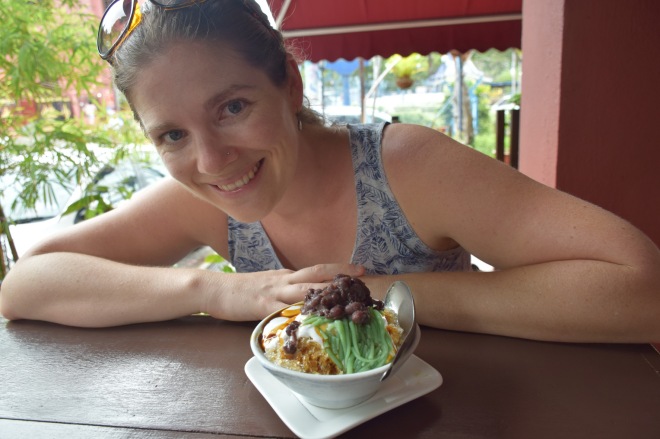
The best Nonya cendol in Malacca!
